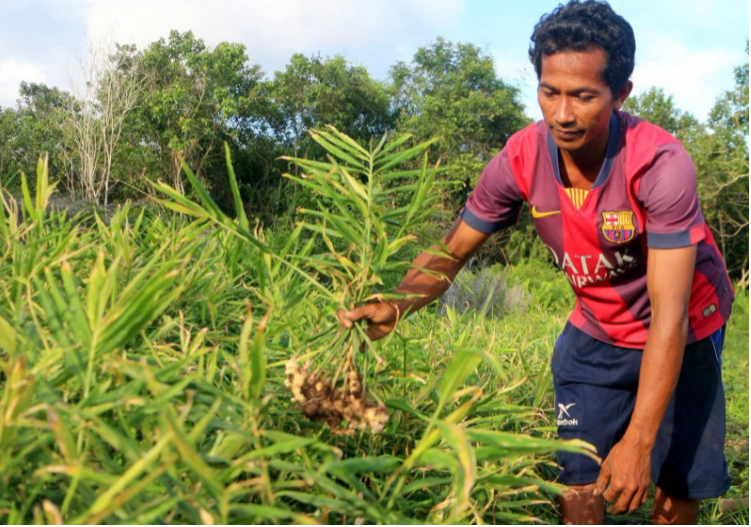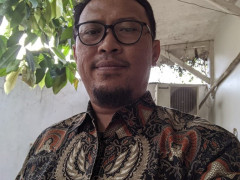Areca Palms Wilting in Terap River
By Pantau GambutPromising Peat Ginger Profits during the Pandemic
"It's not just the money (profit) that makes me happy, but the value of the hard work. I successfully cultivated ginger like the other farmers," said Subairi when we met him at his ginger plantation two months ago.
This was Subairi's experience when he started his ginger cultivation business about three years ago. The 33-year-old man was interested in cultivating ginger after seeing a friend's success in another village.
"My friend let me borrow 15 kilograms of ginger seeds. He said, please replace it once you have a successful harvest," recalled the resident of Kalibandung Village, Sungairaya Sub-District, Kubu Raya District, West Kalimantan Province.
Subairi planted the ginger seeds in two beds measuring 18 x 9.5 meters each. He spent Rp. 300,000 to pay for the beds.
"That was the initial capital required because I didn't have to buy fertilizers. I use my father's cow dung as manure," he explained.
Subairi's business continued to grow, he now has 30 ginger beds in a 0.5 ha area. His last harvest was last September - amidst the Covid-19 pandemic, he harvested two tons of ginger. This father of two also made approximately Rp. 22.4 million of profit from his ginger harvest out of the Rp. 36 million of total revenue.
Burnt land
Subairi cultivated ginger in an area formerly used as a rubber plantation, which was burned down in 2015. The land was planted with oil palm, but he did not pursue this endeavor due to a lack of capital.
"I will cut down the oil palm trees. I will replace it with ginger when I have the capital," said Subairi, pointing to the oil palm trees surrounding his ginger plantation.
Subairi preparing his land for ginger cultivation ©Aries Munandar for Pantau Gambut
He admitted that he had no difficulties in cultivating the land and taking care of the ginger plants, his only issue is raising the additional capital required to develop his business. Subairi has to spend at least Rp. 13.5 million to manage 30 ginger beds, including paying the harvesters' wages. As an effort to reduce expenses, he also uses oil palm leaves as a substitute for paranet (plastic net for plant protection).
"Paranet is expensive, a roll is approximately Rp. 1.4 million. I need at least two rolls," he explained.
Subairi and other farmers in Kalibandung do not burn peatlands to prepare them for cultivation, they rely on ash to reduce acidity and loosen the peat. The ash comes from litter or from land clearing waste that is burned outside the area.
"The land was not burnt, the waste from land clearing was piled up outside of the area," he continued.
The land burning method is still commonly used by farmers in a number of areas in West Kalimantan. This tradition is known as mandok or pandok. The burning used is in the form of ember so the fire does not blaze.
"People no longer risks burning the land because it is prohibited and there is a threat of punishment that comes with it. They are also afraid that their land will be sprayed by helicopters (water bombs from the National Disaster Management Agency)," said Hayat, Head of the Kalibandung Farmers Group Association.
The method of burning land before planting should be abandoned to prevent peat fires. The government is currently intensifying the use of the Land Management Without Burning (PLTB) method through the Peat Restoration Agency (BRG), which taught the method to a number of farmers through the Farmer Field School program. Through this method, farmers can use the F1 embio liquid organic fertilizer to reduce peat acidity so they no longer have to use the ash resulting from burning.
However, ginger is not a paludiculture species, i.e. a local species that can grow well in wet peatland conditions. Ginger plants require dry land. Therefore, when cultivating ginger plants, the peatland should be drained to ensure that these plants could optimally grow. This is certainly not in line with sustainable peatland management efforts. Sustainable peatland management has to keep the peatlands wet, which is in its ideal condition.
Market access
Ginger is now a primadonna commodity in Kalibandung Village. A number of new players have also emerged because the prices and market share are relatively promising. The demand for ginger is increasing during the Covid-19 pandemic.
"I have only been cultivating ginger for a year because the price is relatively good. The maintenance is also easy. It's the only difficulty in the beginning (clearing the land) because you have to pull out the (remaining) tree roots," said Oderi, a ginger farmer who also uses land that was burned in 2015.
Oderi has been working as a construction worker. He began to intensify his land cultivation activities since the Covid-19 pandemic started. The 50-year-old man made approximately Rp 8 million in profit from the 8 ginger beds he harvested last September. Kalibandung farmers sell their ginger to a number of collectors for IDR 18,000 per kilogram. The farmers have difficulty in meeting the increasing demands.
"Sometimes we have the stock, sometimes we don't. When there is ginger that is ready to be harvested, the collectors will immediately purchase it," explained Hayat.
Based on the collector's confession to Hayat, gingers from Kalibandung are supplied to a well-known national herbal company. The company needs additional raw materials to meet increasing consumer demands during the Covid-19 pandemic. The Kalibandung Village Government also considered making ginger a mainstay product, in addition to the various horticultural commodities cultivated by the local residents. They have prepared an assistance package for the farmers, but the budget was recently re-allocated for the Covid-19 pandemic.
"The assistance is not specifically for ginger farmers, but for horticultural (commodity) development. However, the budget has been re-allocated for social assistance and Covid-19 prevention," said Sanhaji, Head of Kalibandung Village.
The Kubu Raya District Government also considers ginger as one of the regional strategic commodities. They encourage processing ginger into various food products to create additional value and a domino effect.
"There is a District Head Regulation concerning the development of local products. Kubu Raya also has a gallery of superior products as well as a number of small and medium-sized businesses that process ginger. Each regional institution is directed to serve drinks made from the local ginger to their guests or to serve these drinks at official meetings and events," said Muda Mahendrawan, District Head of Kubu Raya, last week.




